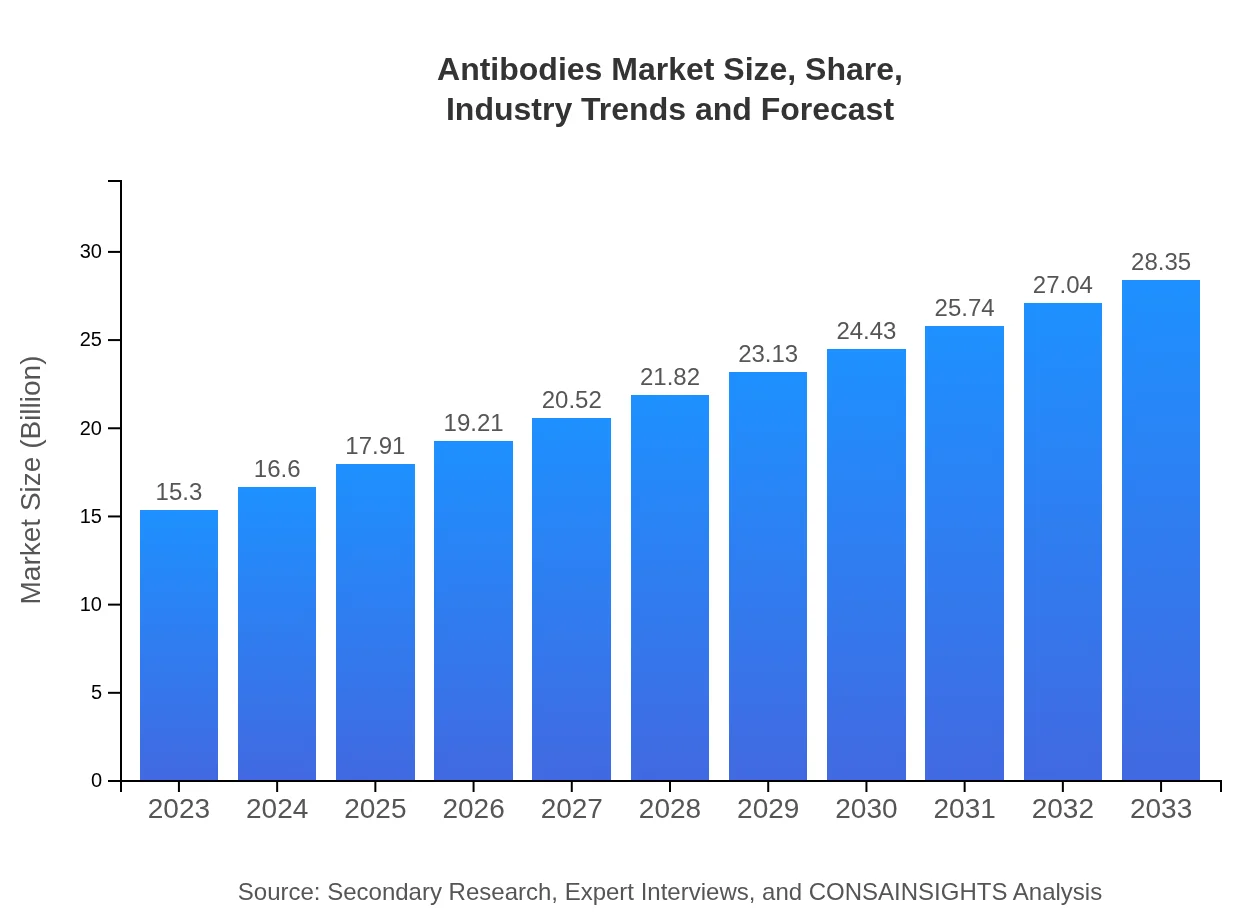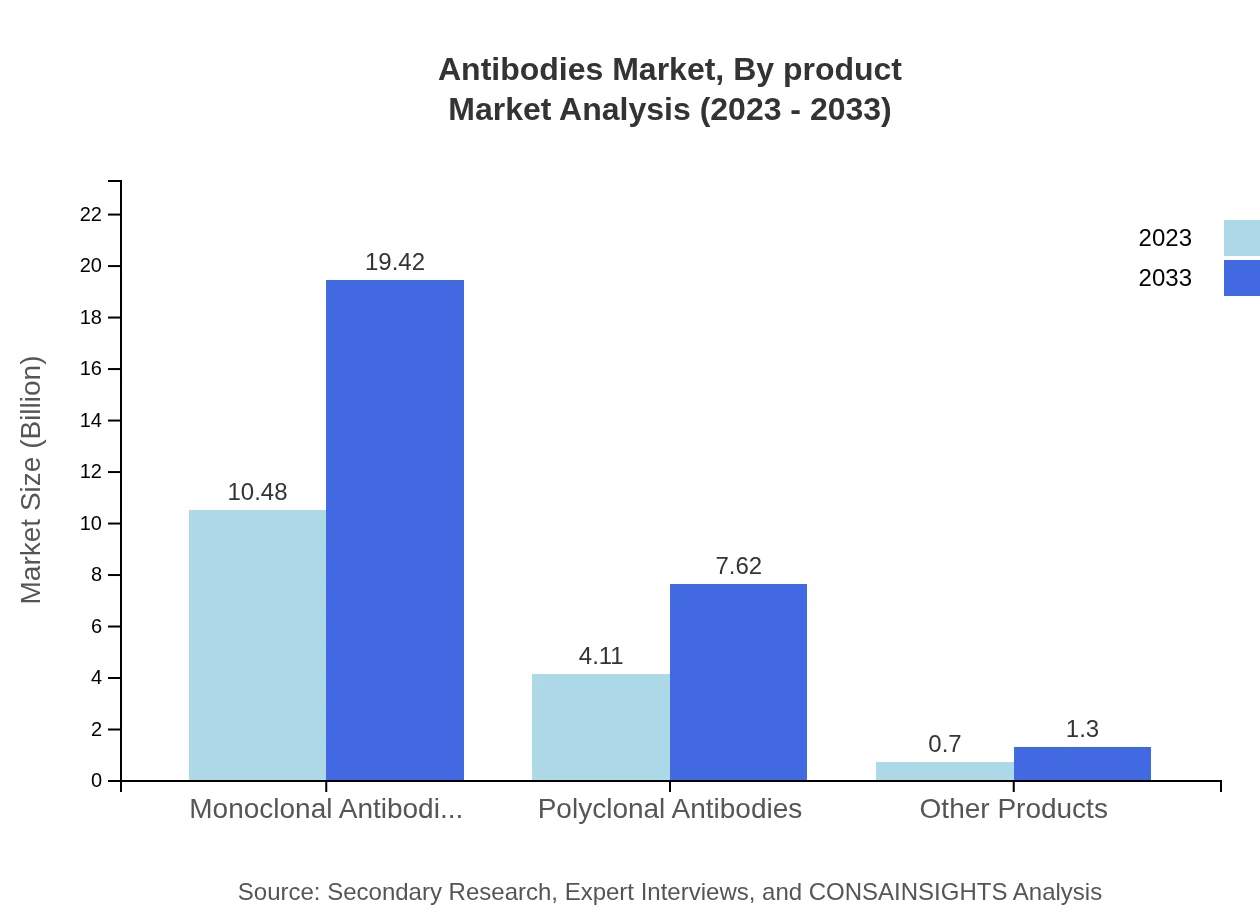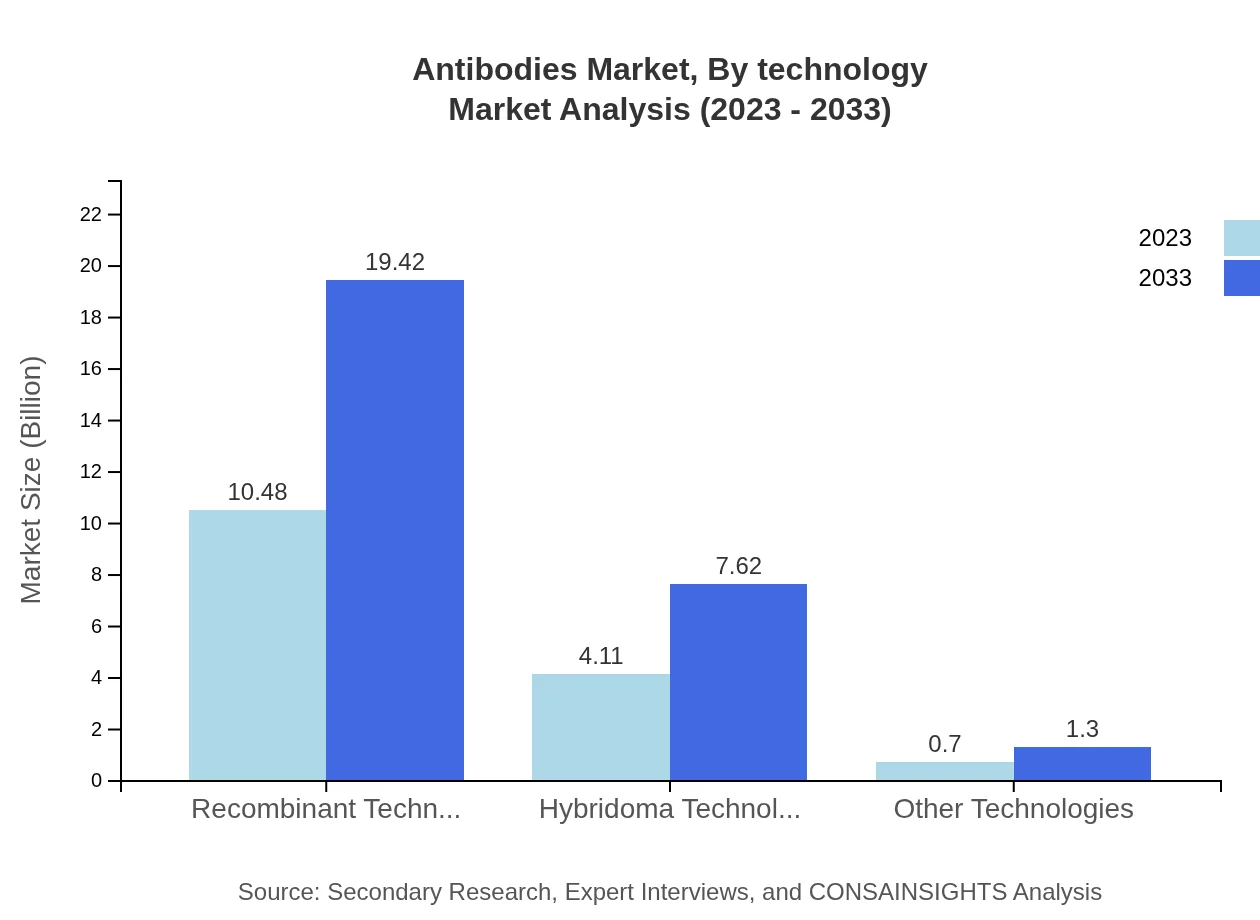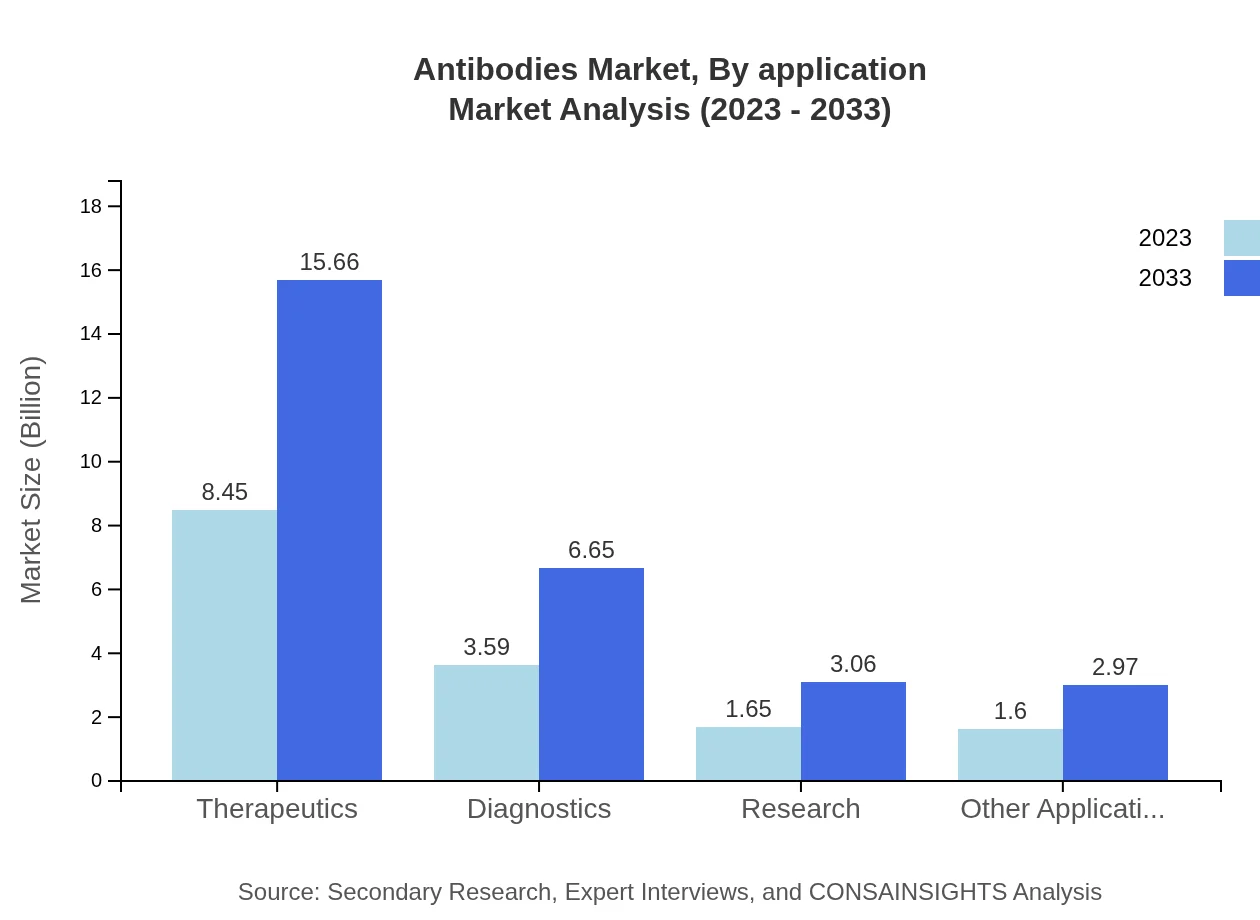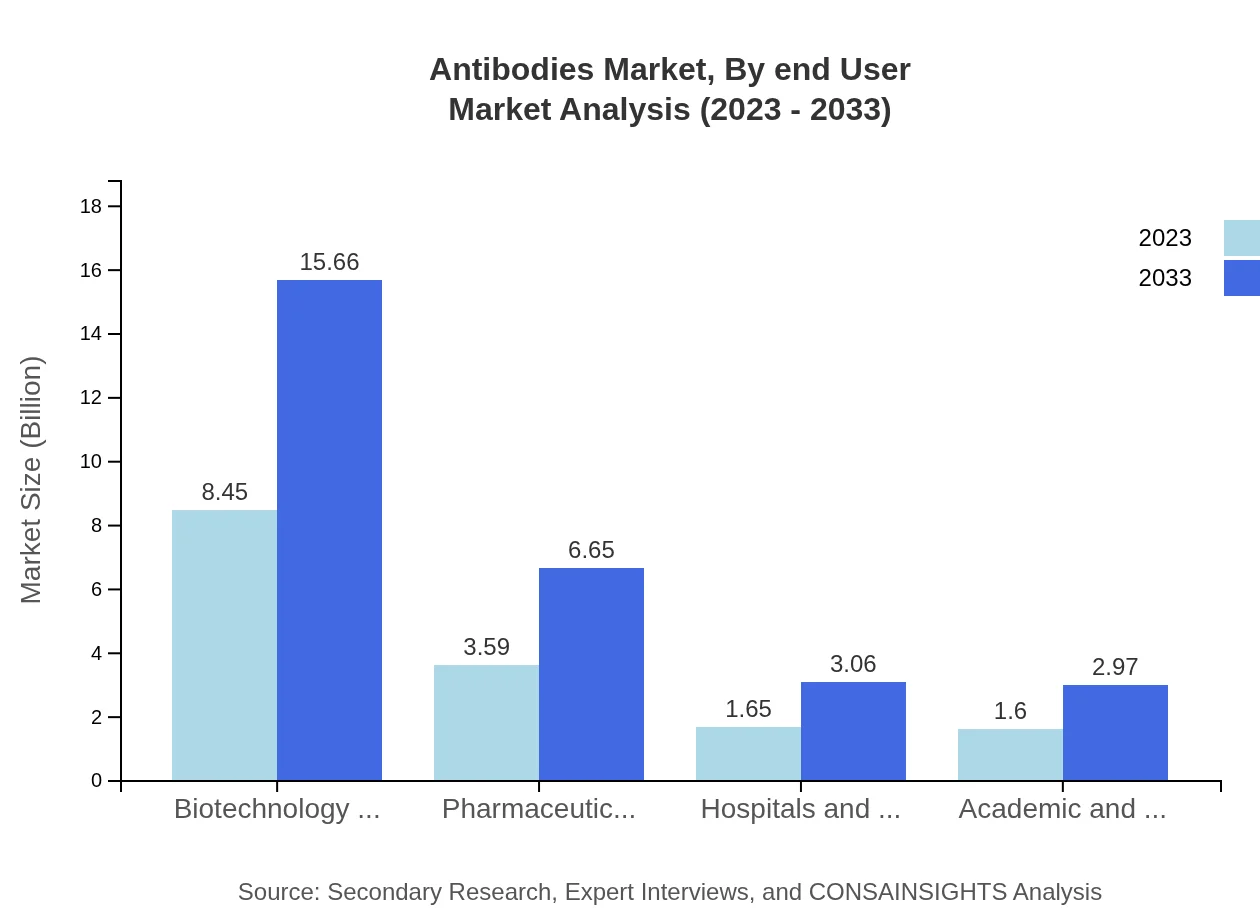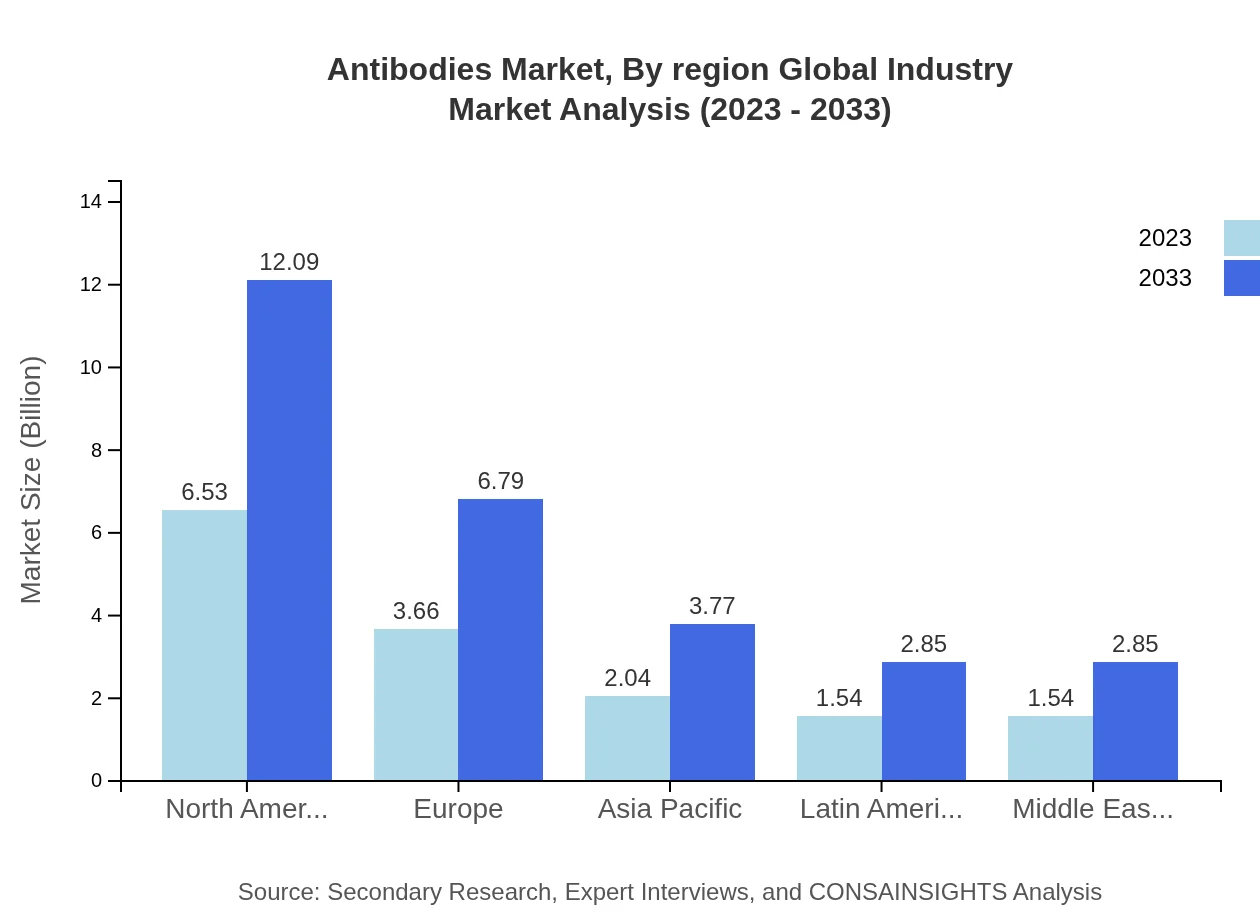Antibodies Market Report
Published Date: 31 January 2026 | Report Code: antibodies
Antibodies Market Size, Share, Industry Trends and Forecast to 2033
This market report examines the Antibodies sector, providing insights on market size, growth forecasts, industry trends, and regional analyses up to the year 2033.
| Metric | Value |
|---|---|
| Study Period | 2023 - 2033 |
| 2023 Market Size | $15.30 Billion |
| CAGR (2023-2033) | 6.2% |
| 2033 Market Size | $28.35 Billion |
| Top Companies | Roche Diagnostics, AbbVie, Johnson & Johnson, Amgen, GSK |
| Last Modified Date | 31 January 2026 |
Antibodies Market Overview
Customize Antibodies Market Report market research report
- ✔ Get in-depth analysis of Antibodies market size, growth, and forecasts.
- ✔ Understand Antibodies's regional dynamics and industry-specific trends.
- ✔ Identify potential applications, end-user demand, and growth segments in Antibodies
What is the Market Size & CAGR of Antibodies market in 2023?
Antibodies Industry Analysis
Antibodies Market Segmentation and Scope
Tell us your focus area and get a customized research report.
Antibodies Market Analysis Report by Region
Europe Antibodies Market Report:
The European Antibodies market registered a value of $3.75 billion in 2023, projected to reach $6.95 billion by 2033. Strong healthcare systems, increasing demand for personalized medicine, and investments in biotechnology drive growth in this region. Regulatory support for innovative therapies provides a fertile ground for market expansion.Asia Pacific Antibodies Market Report:
In 2023, the Antibodies market in Asia Pacific is estimated to be valued at $3.23 billion, growing to approximately $5.99 billion by 2033. Growing healthcare infrastructure and rising investments in biotechnology are key market drivers in this region. Increasing prevalence of chronic diseases and demand for advanced therapeutic options further enhance market growth.North America Antibodies Market Report:
North America is the leading region in the Antibodies market, valued at $4.93 billion in 2023 and anticipated to grow to $9.13 billion by 2033. The demand for advanced treatment options, coupled with increased R&D activities by pharmaceutical firms, drives growth in this region. The presence of major biopharmaceutical companies significantly contributes to market expansion.South America Antibodies Market Report:
By 2023, South America's Antibodies market is projected to reach $1.42 billion, with expectations of hitting $2.63 billion by 2033. This growth is fueled by a gradually improving healthcare sector and the accessibility of antibody therapies. Economic growth and increased focus on healthcare investments are expected to positively impact the market.Middle East & Africa Antibodies Market Report:
In 2023, the Antibodies market in the Middle East and Africa is estimated at $1.97 billion, rising to $3.65 billion by 2033. Expanding healthcare frameworks and increasing awareness about antibody therapies contribute to market growth. Despite challenges such as resource constraints, opportunities for growth remain significant.Tell us your focus area and get a customized research report.
Antibodies Market Analysis By Product
In terms of products, monoclonal antibodies are displaying impressive growth, valued at $10.48 billion in 2023 with a forecasted increase to $19.42 billion by 2033. Polyclonal antibodies represent a smaller segment, valued at $4.11 billion in 2023 and expected to grow to $7.62 billion in 2033. Other antibody products contribute minimally, estimated at $0.70 billion in 2023 and rising to $1.30 billion by 2033.
Antibodies Market Analysis By Technology
The technology segment is dominated by recombinant technology, accounting for $10.48 billion in 2023, set to increase to $19.42 billion by 2033. Hybridoma technology follows, valued at $4.11 billion in 2023, expected to grow to $7.62 billion. Other technology segments remain smaller, with revenues of $0.70 billion in 2023 rising modestly.
Antibodies Market Analysis By Application
Therapeutics lead the application segment, valued at $8.45 billion in 2023 and projected to reach $15.66 billion by 2033. Diagnostics also play a significant role, generating $3.59 billion in 2023 and anticipated to reach $6.65 billion. Research activities contribute at $1.65 billion in 2023, expected to grow to $3.06 billion.
Antibodies Market Analysis By End User
The end-user segment indicates the leading position of biotechnology companies, valued at $8.45 billion in 2023, growing to approximately $15.66 billion by 2033. Pharmaceutical companies and hospitals/clinics follow, with respective values of $3.59 billion and $1.65 billion predicted to grow into $6.65 billion and $3.06 billion by 2033.
Antibodies Market Analysis By Region Global Industry
The global Antibodies market is witnessing expansive growth across regions. North America remains the strongest market, driven by advanced healthcare technologies and substantial R&D investments. Europe closely follows with strong regulatory frameworks favoring innovation. Asia Pacific is rapidly emerging due to improving healthcare infrastructure and economic growth. Latin America and the Middle East & Africa are smaller yet have growing markets fueled by increasing healthcare demands.
Antibodies Market Trends and Future Forecast
Tell us your focus area and get a customized research report.
Global Market Leaders and Top Companies in Antibodies Industry
Roche Diagnostics:
Roche is a global leader in in-vitro diagnostics, known for several monoclonal antibody products and pioneering biotechnology.AbbVie:
AbbVie is a major player in the biopharmaceutical market, with a strong portfolio of monoclonal antibodies for various therapeutic areas.Johnson & Johnson:
Johnson & Johnson has a considerable presence in the antibodies market, developing multiple innovative therapies and diagnostics.Amgen:
Amgen focuses on biotechnology innovation, offering a diverse range of monoclonal antibodies in various treatment areas.GSK:
GlaxoSmithKline is committed to developing antibody-based therapies, emphasizing immunology and oncology.We're grateful to work with incredible clients.









FAQs
What is the market size of antibodies?
The antibodies market is projected to reach $15.3 billion with a CAGR of 6.2% by 2033, reflecting a robust growth trajectory from current market dynamics.
What are the key market players or companies in this antibodies industry?
Key players in the antibodies market include major biotechnology and pharmaceutical companies, which continue to innovate and expand their portfolios to capture growth opportunities.
What are the primary factors driving the growth in the antibodies industry?
Growth in the antibodies market is driven by rising prevalence of chronic diseases, advancements in biotechnology, and increasing R&D investments across pharmaceutical sectors.
Which region is the fastest Growing in the antibodies?
North America is the fastest-growing region in the antibodies market, with a projected market size increase from $4.93 billion in 2023 to $9.13 billion by 2033.
Does ConsaInsights provide customized market report data for the antibodies industry?
Yes, ConsaInsights offers customized market report data tailored to specific needs within the antibodies industry, helping businesses make informed decisions.
What deliverables can I expect from this antibodies market research project?
Deliverables from the antibodies market research project include detailed market analysis, segment data, trends, and actionable insights for strategic planning.
What are the market trends of antibodies?
Current trends in the antibodies market include increased reliance on monoclonal antibodies in therapeutics and growing investment in advanced biomanufacturing technologies.

